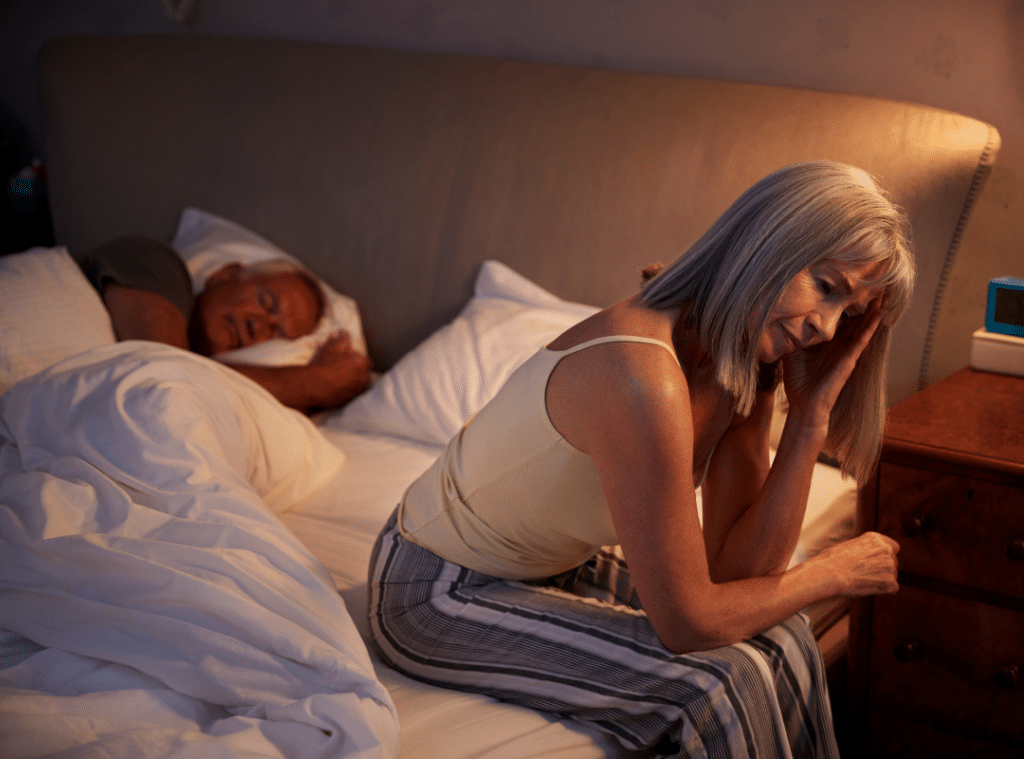If you or a loved one is experiencing insomnia in seniors, you’re not alone—and more importantly, you’re not without solutions. Aging often brings changes to sleep cycles, hormonal balance, and daily routines, making restful nights more difficult to achieve. But there’s hope.
Through practical lifestyle adjustments, awareness of medication side effects, and natural remedies, seniors can reclaim their sleep and improve overall health. Whether you’re dealing with insomnia in elderly women or trying to avoid drugs that cause insomnia in the elderly, the right guidance can make all the difference. This article explores solutions, tips, and supportive resources, including how Westmont of Riverside can help—visit us at Westmont of Riverside.
Understanding Insomnia in Seniors
As we age, changes in our circadian rhythms, health conditions, and stress levels can lead to persistent sleep issues. For many seniors, it’s not just about getting less sleep—it’s about getting lower-quality sleep. You might find yourself waking up frequently or feeling tired even after a full night in bed. This disruption impacts not only your rest but also your daily functioning and mental clarity.
Aging doesn’t have to mean poor sleep. Simple shifts in behavior and environment, like limiting screen time before bed or keeping a steady sleep schedule, can make a difference. Learn how to foster restful sleep by exploring how habits and routines affect your ability to fall—and stay—asleep.
Common Causes of Insomnia in the Elderly
There are several contributing factors to insomnia in seniors, and identifying them can guide you to the right solutions.
| Cause | Description | Sleep Impact |
| Circadian Shifts | Changes in the internal clock | Disrupted sleep-wake cycles |
| Health Conditions | Arthritis, anxiety, heart disease | Nighttime discomfort |
| Medication Side Effects | Adverse reactions to prescriptions | Frequent awakenings |
| Stress or Isolation | Emotional struggles, loneliness | Difficulty falling asleep |
For deeper insight into these causes, check out this helpful guide on unlocking insomnia triggers.
Medications That May Trigger Sleep Problems
A surprising number of medications can worsen or cause insomnia in seniors. Whether you’re taking pills for blood pressure, depression, or allergies, these prescriptions may be affecting your rest.
Drugs That Cause Insomnia in the Elderly
Some drugs that cause insomnia in the elderly include:
| Medication Type | Examples | Sleep Impact |
| Antidepressants | SSRIs like fluoxetine | Delay REM sleep, increase waking |
| Stimulants | ADHD medications | Increased alertness at bedtime |
| Diuretics | Furosemide, HCTZ | Nighttime urination disrupts rest |
These medications are particularly impactful for those with existing conditions like anxiety or heart disease. Understanding these connections is vital. You can also explore this article on sleep disorders and anxiety.
Why Consultation Matters
Always consult your healthcare provider when adjusting your medication. Even natural remedies for insomnia in the elderly can interact with prescriptions. Open dialogue can help tailor your care plan and reduce any negative sleep side effects. If you’re experiencing ongoing fatigue or insomnia symptoms like mental fog, it may be time to re-evaluate your prescriptions.
Best Remedies for Insomnia in the Elderly
Whether you’re searching for a remedy for insomnia for the elderly or just want a better bedtime routine, several approaches can improve sleep quality.
Sleep Environment Optimization
A sleep-friendly environment is critical. Follow these tips:
- Use blackout curtains to block light
- Set room temperature between 60 and 67°F
- Choose a supportive mattress
- Avoid screens at least 1 hour before bedtime
These small changes can dramatically reduce sleep disruptions.
Relaxation Techniques Implementation
Integrating relaxing bedtime rituals can help regulate your nervous system. Try:
| Technique | Purpose |
| Deep breathing | Lowers heart rate |
| Guided imagery | Calms racing thoughts |
| Progressive muscle relaxation | Eases physical tension |
| Meditation | Enhances mental clarity |

Natural Remedies for Insomnia in the Elderly
If you’re looking for natural remedies for insomnia in the elderly, consider holistic alternatives like:
- Herbal teas (chamomile, lemon balm)
- Aromatherapy (lavender essential oil)
- Gentle yoga before bed
- Melatonin (as advised by a doctor)
These approaches promote relaxation without the risks associated with pharmaceuticals. Always check with a healthcare provider before starting a new supplement.
Explore more: National Institute on Aging – Sleep and Aging
Learn about complementary health: NCCIH – Insomnia and Complementary Health Approaches
Insomnia in Elderly Women
Insomnia in elderly women can be more common due to menopause-related hormone shifts, anxiety, or caregiving responsibilities. It’s essential to monitor how these factors uniquely impact sleep and look for gender-specific treatments.
- Talk to your doctor about hormonal changes
- Practice stress-reducing techniques
- Join support groups to relieve emotional burdens
Empowerment comes from recognizing that these experiences are common—and manageable with the right help.
Importance of Sleep Hygiene
Effective sleep hygiene routines support your body’s natural rhythms. Here’s how to create a restorative bedtime plan:
- Go to bed and wake up at the same time daily
- Avoid caffeine or alcohol late in the day
- Engage in light exercise during the day
- Keep bedroom tech-free
By maintaining these habits, your body will adapt and begin to prepare for sleep naturally—improving the symptoms of insomnia in seniors over time.
When to Consult a Healthcare Provider
If insomnia is affecting your mood, memory, or safety, it’s time to seek professional advice.
| Sign | Possible Cause | Next Step |
| Frequent waking | Pain, anxiety | Discuss with the physician |
| Daytime fatigue | Poor nighttime rest | Evaluate the sleep environment |
| Irritability or depression | Sleep deprivation effects | Consider therapy or a support group |
| Medication changes | New prescriptions | Review with the doctor |
Westmont of Riverside also offers guidance on these issues and can help coordinate care with your medical team.
Reclaim Your Sleep—Take the First Step Toward Better Rest
You don’t have to settle for sleepless nights. If you or a loved one is facing insomnia in seniors, it’s time to take action. From addressing drugs that cause insomnia in the elderly to exploring natural remedies for insomnia in the elderly, the right plan can help you regain control of your rest and well-being.
At Westmont of Riverside, we provide a safe, caring environment where seniors can thrive. Our supportive team helps residents create healthy sleep routines and explore gentle, personalized solutions.
Ready to sleep better? Call us today at 951-697-2100 or schedule a tour to discover how we can help.
Restful nights await—let’s reclaim them together.
Discover the level of care you or your family member requires. What Level of Care Do You Need?
Frequently Asked Questions
How do you treat insomnia in the elderly?
Treating insomnia in the elderly often begins with lifestyle adjustments, such as establishing a consistent bedtime routine, limiting caffeine and alcohol intake, and engaging in daily exercise. Doctors may also suggest cognitive behavioral therapy (CBT-I), which helps change negative sleep patterns and behaviors. In some cases, short-term use of sleep aids may be recommended, but these should be carefully monitored due to potential side effects. Natural remedies, such as relaxation techniques or herbal teas, can also provide relief without relying heavily on medication.
What causes the elderly to not sleep at night?
Many seniors experience disrupted sleep due to age-related changes in their circadian rhythm, making them feel sleepy earlier in the evening and wake earlier in the morning. Health conditions such as arthritis, sleep apnea, or restless leg syndrome can also disrupt sleep. Medications prescribed for chronic illnesses may have side effects that disturb sleep. Additionally, anxiety, loneliness, or depression can contribute to nighttime wakefulness in the elderly.
What is the most common sleep disorder in the elderly?
Insomnia is the most common sleep disorder among older adults, affecting their ability to fall asleep, stay asleep, or wake too early. Other prevalent issues include sleep apnea and restless leg syndrome, which further complicate restful sleep. These conditions not only reduce sleep quality but also affect overall health and daily energy levels. Identifying the specific cause of sleep disturbances enables more effective treatment and management.
What time do 70-year-olds go to bed?
On average, many 70-year-olds tend to go to bed earlier, often between 8:00 PM and 10:00 PM, due to natural changes in their internal body clock. Seniors may also wake up earlier, around 4:00 AM to 6:00 AM, which is part of the aging process. While this shift is normal, maintaining a consistent sleep schedule can help improve sleep quality. However, the exact bedtime varies depending on individual health, activity levels, and personal habits.








